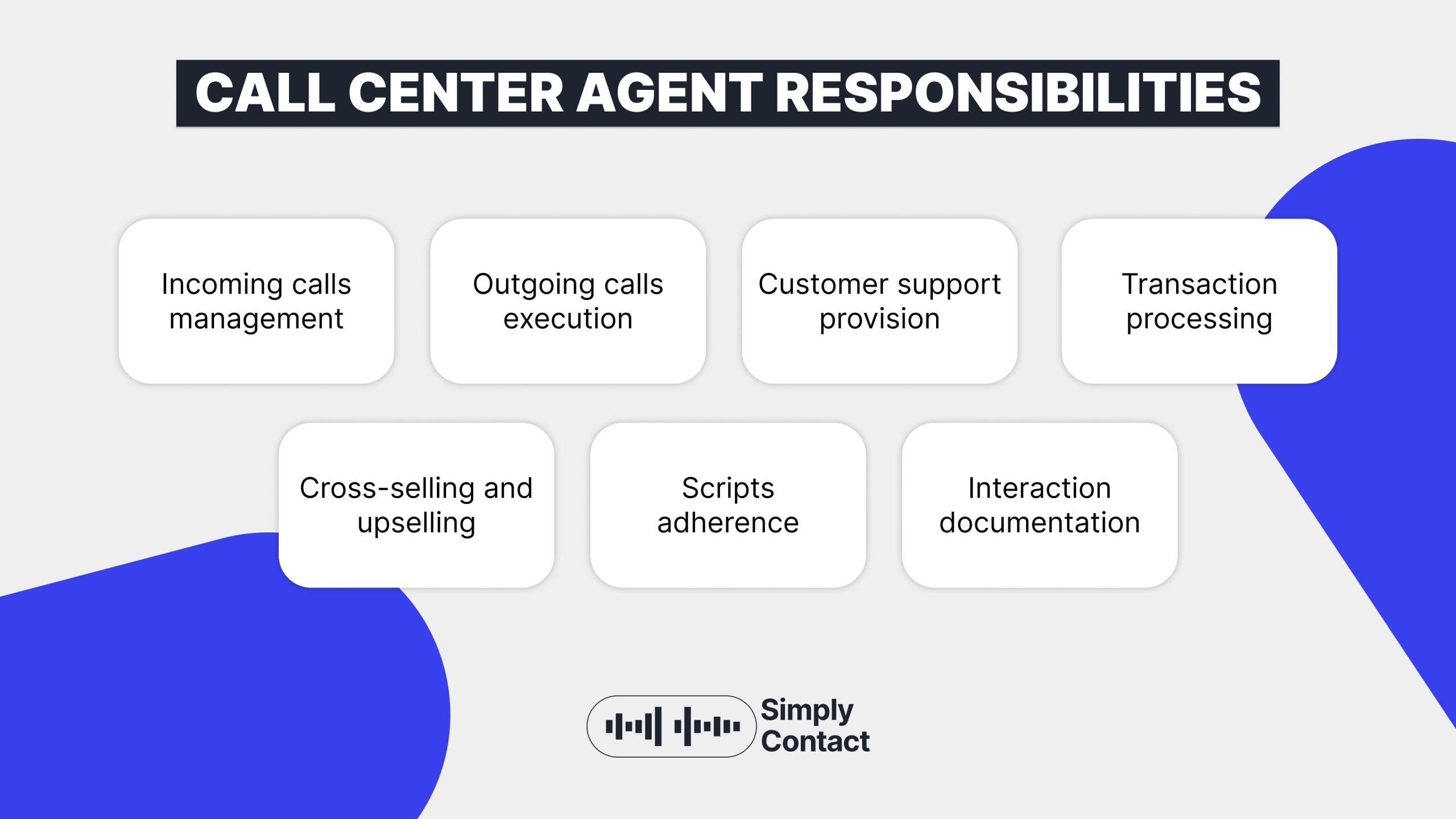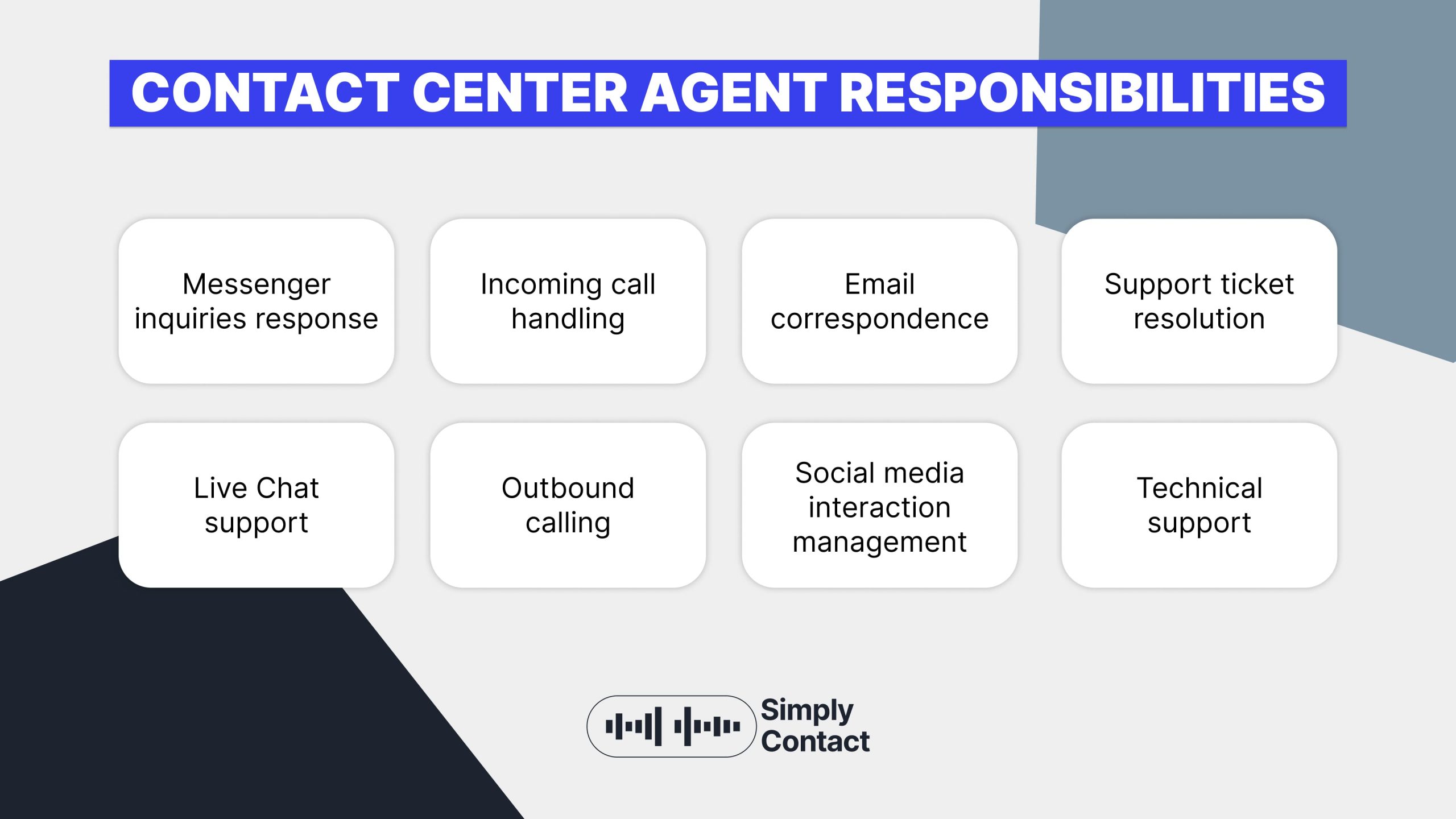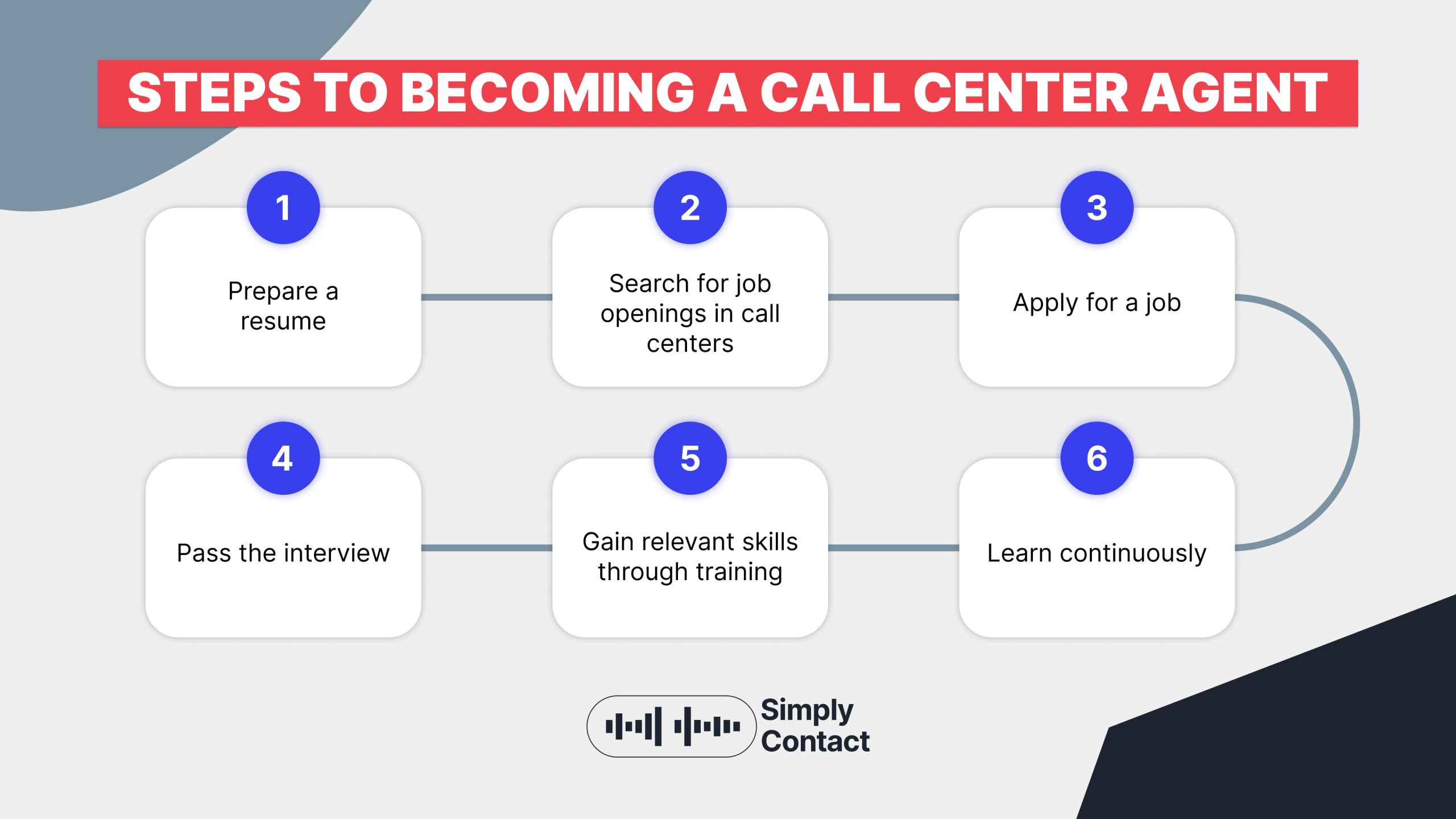At Simply Contact, we specialize in creating personalized customer support solutions that drive business growth and customer satisfaction. Let us help you elevate your customer experience and stand out from the competition.

How To Become A Call Center Agent: A Comprehensive Guide
What does it take to be a call center agent? This is the first point of contact with a company, which requires agents to constantly demonstrate flexibility and empathy for handling different customer requirements. The high stress levels reported by 87% of call center workers lead to industry-wide employee turnover rates reaching 30–45%, which stands as one of the highest in all sectors. The job requires agents to handle different customer complaints and attitudes, and specific concerns, which makes the work challenging and complicated.
The current discussion about AI customer service replacing human agents does not affect the fact that customers want human interaction, and job openings for call center positions exist on all major employment websites. Human empathy and judgment remain essential elements for delivering outstanding service to customers.
In this article, we explore everything about the essential competencies needed to become a call center agent, including training and the specific duties agents perform. We also examine the essential qualifications and abilities needed for call center agents while comparing them to contact center agents who work in similar customer service positions.

What is a call center agent?
A call center agent functions as the person who handles both incoming and outgoing business customer phone calls. The frontline of customer service consists of call center agents who handle problem resolution, information delivery, inquiry responses, and product/service sales through phone interactions.
The role has become essential for businesses because they need to improve customer satisfaction and maintain customer loyalty. The modern world demands call center agents to constantly adjust to always-changing consumer expectations.
Who is a contact center agent?
The modern customer service industry requires agents to handle multiple communication methods, which has led to the development of contact center agents who handle contact center operations.
A contact center agent functions as the advanced version of customer service professionals who deliver complete multichannel assistance to customers.
Contact center agents handle customer interactions through multiple communication channels instead of just phone calls, in contrast to call center agents. The customer service experience remains seamless because contact center agents handle email support, live chats, social media, messaging apps, and video calls.
Contact center agents provide complete customer service through any communication method that customers select. Omnichannel customer support enables agents to deliver adaptable services, matching the changing requirements of digital consumers.
What does a call center agent do?
The main responsibility of call center agents involves managing customer interactions through telephone communication. The main duties of a call center agent include delivering top-quality customer support. The specific tasks of call center agents focus on delivering customer satisfaction through phone-based service for various customer requirements.

The main duties of call center agents include:
- Receiving customer calls to answer their inquiries, solve their problems, and deliver product and service information.
- Performing outbound calls to achieve different goals, which include following up on customer inquiries, conducting satisfaction surveys, and delivering information about new company services and promotions.
- Helping customers by solving their problems and walking them through troubleshooting steps while answering all questions about company services and products.
- Handling transactions by processing orders and payments and making changes to customer accounts while maintaining both accuracy and efficiency.
- Recommend supplementary products and services to customers when appropriate because this practice benefits both customer satisfaction and company revenue growth.
- Using call scripts to maintain service consistency and follow company rules, but they need to modify their communication approach based on each customer's particular needs.
- Keeping track of customer interactions, transactions, and feedback, which becomes vital information for service improvement and future inquiry handling.
Call center agents perform multiple customer interaction tasks, which include handling complaints, sales work, pre-sales help, payment management, account inquiries, service changes, appointment bookings, and other duties.
What does a contact center agent do?
Contact center agents lead the shift toward modern customer service because they handle support requests through digital channels as well as traditional voice calls. The flexible nature of their work allows agents to interact with customers through different communication channels, including social media and email, which results in a complete support system for digital customer needs.

LContact center agents perform multiple essential duties, which make up their daily work responsibilities.
- Fast responding to customer inquiries, which they receive through different messaging systems, while providing complete solutions to all customer problems.
- Possessing all the required tools and training to handle customer needs effectively through phone calls.
- Handling email correspondence by answering customer questions and providing detailed responses to their inquiries.
- Solving support ticket problems that customers submit through web forms while delivering solutions that build customer loyalty.
- Using live chat to provide immediate assistance to customers while handling their current needs.
- Conducting outbound phone calls to execute different tasks, including lead acquisition and sales activities, customer feedback collection, and promotional message delivery.
- Tracking social media platforms to answer customer questions and comments, which helps maintain a positive brand image and fast customer service.
- Providing technical support by guiding customers through problem-solving steps to resolve their technical issues directly.
Contact center agents provide complete customer support through multiple communication channels, which include phone calls, email, live chat, social media, and additional platforms. The ability of agents to manage various communication channels makes them essential for delivering customer service that provides accessible and individualized responses.
Types of call center jobs you can apply for
If you're wondering what a call center job is like and what career opportunities it offers, here are some positions you can consider.
Call center agent
Call center agents handle day-to-day tasks. They help with questions, troubleshoot errors, and provide information to customers. Depending on the company's tools and services, agents may also support customers via email, chat, or other communication channels. On job boards, you’ll find roles hired directly into an in-house support team as well as positions offered by customer service outsourcing providers. The key difference is that outsourcing companies support multiple clients, while in-house roles focus exclusively on a single brand.
Team leader
The team leader oversees agents by performing leadership duties and supervisory responsibilities. They monitor staff performance to achieve effective team operation through skill development and productivity enhancement. A team leader needs to master the ability to handle multiple tasks at once. They conduct scheduled meetings with supervisors to share performance updates and obtain guidance about their work activities.
Call center head
A call center operates under the supervision of its head, who controls all activities. The head of the call center must establish future directions for the organization while developing methods to enhance customer service quality. This person maintains responsibility for both staff productivity and complete performance results at the call center.
Operational manager
The operational manager of a call center works to achieve performance targets by running efficient operations that deliver excellent customer service. The manager oversees teams to develop strategic plans based on established procedures while ensuring the organization stays compliant with company rules.
Trainer
Call centers have constant staff turnover. The training team delivers new employee onboarding programs, which teach staff members to meet organizational standards. The trainer’s responsibility is to provide training programs to agents while teaching them about call center technology systems and equipment.
Requirements and qualifications for call center jobs
The delivery of top-notch service depends on call center agents who demonstrate outstanding soft skills. The agents may need to demonstrate both general corporate knowledge and specialized industry expertise.
The representatives of banking and insurance companies who work in call centers can benefit from an educational background and training because it helps them understand their business operations better.
The training process for agents may occur before or after employment to guarantee they can perform their duties effectively. The training program at Simply Contact delivers complete on-the-job preparation to ready agents for their particular responsibilities.
The following list contains all the necessary qualifications and requirements for call center agent positions:
- A degree from a university represents the preferred educational requirement, although it is not mandatory.
- Experience from customer service roles, sales positions, and related fields. The company benefits from agents who have worked in their specific industry sector because we offer services across tech support, retail, aviation, and travel industries.
- Great written and spoken communication and interpersonal abilities. Agents need to present information to customers in a manner that makes the service delivery process both understandable and satisfying for the customers.
- The ability to communicate through writing and speaking, along with interpersonal abilities. Agents need to deliver information in a way that customers can understand and feel satisfied with their service.
- Language proficiency: for example, the agents at Simply Contact demonstrate Upper-intermediate (B2) language proficiency in English, German, and other languages. Organizations that offer multilingual customer support gain a market advantage through agents who speak multiple languages.
- Empathy and sociability, responsibility, a growth mindset, and results-driven behavior.
The call center qualifications aim to develop customer support specialists who deliver responsive support while showing empathy and maintaining informed interactions with customers. The skills that Simply Contact values most lead to better customer satisfaction and loyalty.eet the evolving needs of customers, providing support that is not only responsive but also empathetic and informed. Simply Contact values these skills highly, as they directly contribute to customer satisfaction and loyalty.
Skills that make a great call center agent
A support agent needs to possess specific skills to succeed in their fast-paced work environment.
- Delivering complex information with professionalism and actively listening to understand both spoken and implied messages are the crucial skills for effective communication that agents need to possess.
- The customer base demands immediate, effective solutions for their problems. Agents need to use critical thinking skills while showing confident actions in their work.
- Every customer interaction does not present simple challenges. The practice of staying calm while being respectful and supportive helps customers develop trust and maintain loyalty.
- The agent needs to handle multiple tasks at once by keeping their attention focused on system management and data entry while speaking to customers.
- The daily operations of call center software and CRM platforms require technical proficiency from agents who deliver faster and more precise results.
- The agent needs to transform their communication style based on the situation.
These call center agent skills are crucial to building long-term success in any call center role. At Simply Contact, we prioritize them in training and hiring to make sure our team provides great support as part of our inbound call center solutions.
How to become a call center agent
Entering the call center industry is accessible to those with strong communication skills and a customer service orientation. While educational backgrounds can vary, the emphasis is on practical experience and the ability to engage effectively with customers.
Here are the steps on how to get a call center job:

1. Prepare a resume
Craft a comprehensive resume that highlights your relevant skills and experiences for a call center role. Previous experience in customer service-related fields such as food service, retail, or sales can be an excellent starting point for your job search.
2. Search for job openings in call centers
Look for call center positions that align with your qualifications and professional interests. Review job descriptions before applying to ensure they align with your qualifications.
3. Apply for a call center jobs
Choose the type of call center that interests you the most. The private sector and public sector offer different compensation packages and career advancement opportunities for their employees.
You can find complete information about current job openings and application procedures at Simply Contact here.
4. Pass the interview
After submitting your job application for call center work, you will receive contact from recruiters who want to conduct an interview. The interview process at call centers occurs through three standard methods, which include phone calls and online or face-to-face meetings.
Your employer uses the interview process to discover your individual characteristics, together with your work experience and educational history.
Your interview success depends on your preparation level, so make sure to prepare thoroughly. Your professional appearance, combined with a CV copy and timely arrival, will establish a positive first impression for your interview.
5. Gain relevant skills through training
The training process at Simply Contact will begin after your interview success and employment acceptance, before you start your assigned project work. The onboarding process depends on our internal training system, which teaches new staff members everything they need to excel in their projects.
Ready to succeed as a call center agent? Learn more about our approach to see how it prepares you with essential skills and customer interaction techniques!
Learn more
6. Continuously enhance your skills
The call center industry experiences ongoing transformations because new customer service approaches and technological solutions keep appearing. Your professional development will become more valuable through participation in workshops, webinars, and certification programs, which help you stay competitive. Your investment in professional development creates opportunities for career advancement, salary increases, and more complex work responsibilities. Your success as a call center agent will result from implementing these steps together with personal development initiatives. Your journey from job candidate to customer service expert becomes more valuable with each learning experience and professional challenge you overcome.

Career growth and promotion opportunities
A call center position demands more than basic phone operations. Call centers offer entry-level positions, which help people develop their skills for customer service work, training, management, and analytics roles.
Development of skills
Agents develop their communication abilities and problem-solving skills and learn to adapt to new situations while building their stress tolerance every day. The abilities developed through call center work prove useful for any career path, including human resources and sales roles.
Transition to management positions
The career path for agents includes roles as team leaders, project managers, and operations directors. Our call center outsourcing company has numerous examples of agents who progressed through these career levels. The essential requirements for success include delivering consistent results and showing initiative and willingness to handle responsibilities.
Flexibility and stability
The job provides suitable conditions for students, young parents, and people who seek dependable employment. The company offers adaptable work hours and remote positions and enables employees to pick projects that interest them.
A call center provides an excellent entry point for people who want dependable work with defined responsibilities and opportunities to gain experience and move up the career ladder.
Summary
Call center success depends heavily on the performance of its representatives, who work as agents. The performance of call center agents determines customer acquisition, satisfaction, and customer retention rates. Call center agents need to demonstrate professional behavior and all required competencies to achieve success in their role.Our guide on becoming a successful call center agent contains practical information you need to start your career in this field. Check our careers page at Simply Contact for any questions or to discover available job openings. Our team members are ready to assist you in your journey toward becoming a successful call center professional.
Get fast answers to any remaining questions
Thank you.
Your request has been sent successfully.
Your request has been sent successfully.






